-
 Bitcoin
Bitcoin $106,782.3966
-0.72% -
 Ethereum
Ethereum $2,406.7764
-1.16% -
 Tether USDt
Tether USDt $1.0005
0.02% -
 XRP
XRP $2.0918
-1.53% -
 BNB
BNB $644.5785
-0.17% -
 Solana
Solana $141.0925
-0.69% -
 USDC
USDC $1.0000
0.02% -
 TRON
TRON $0.2721
0.18% -
 Dogecoin
Dogecoin $0.1585
-1.26% -
 Cardano
Cardano $0.5497
-1.14% -
 Hyperliquid
Hyperliquid $35.8493
-1.58% -
 Bitcoin Cash
Bitcoin Cash $502.3089
2.20% -
 Sui
Sui $2.7092
3.87% -
 Chainlink
Chainlink $12.8551
-1.85% -
 UNUS SED LEO
UNUS SED LEO $9.0548
0.53% -
 Stellar
Stellar $0.2344
-0.85% -
 Avalanche
Avalanche $17.2676
-0.23% -
 Toncoin
Toncoin $2.8282
0.56% -
 Shiba Inu
Shiba Inu $0.0...01113
-1.14% -
 Litecoin
Litecoin $83.9593
-0.93% -
 Hedera
Hedera $0.1447
0.82% -
 Monero
Monero $306.9022
-2.07% -
 Bitget Token
Bitget Token $4.6358
3.42% -
 Dai
Dai $0.9999
0.01% -
 Ethena USDe
Ethena USDe $1.0001
0.02% -
 Polkadot
Polkadot $3.3211
0.06% -
 Uniswap
Uniswap $6.8775
0.75% -
 Pi
Pi $0.5664
-0.27% -
 Aave
Aave $256.0055
1.28% -
 Pepe
Pepe $0.0...09013
-3.24%
How to protect the Bitcoin wallet address? Practical anti-hacking tips
Protect your Bitcoin wallet address with hardware wallets, strong passphrases, 2FA, software updates, cold storage, and vigilance against phishing and social engineering attacks.
May 13, 2025 at 01:00 am
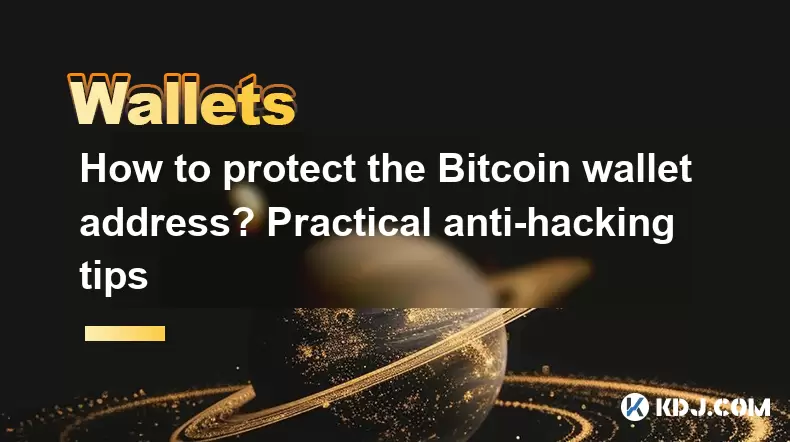
Protecting your Bitcoin wallet address is crucial in safeguarding your digital assets from potential hackers and malicious actors. Bitcoin, as a decentralized digital currency, relies heavily on the security measures implemented by its users. By understanding and applying practical anti-hacking tips, you can significantly reduce the risk of losing your funds. This article will delve into various strategies and best practices to help you protect your Bitcoin wallet address effectively.
Understanding Bitcoin Wallet Security
Before diving into the specific tips for securing your Bitcoin wallet address, it's essential to understand the basics of Bitcoin wallet security. A Bitcoin wallet address is essentially a public key that allows others to send you Bitcoin. However, the corresponding private key, which you must keep secret, is what grants access to the funds associated with that address. The security of your Bitcoin wallet hinges on the protection of your private key.
Use Hardware Wallets
One of the most effective ways to protect your Bitcoin wallet address is by using a hardware wallet. Hardware wallets are physical devices designed to store your private keys offline, making them immune to online hacking attempts. Hardware wallets provide an additional layer of security by keeping your private keys isolated from internet-connected devices.
- Choose a reputable hardware wallet brand such as Ledger or Trezor.
- Purchase the hardware wallet from an official source or authorized reseller to avoid tampered devices.
- Follow the manufacturer's instructions to set up the hardware wallet and generate a new wallet address.
- Store your hardware wallet in a secure location, such as a safe or a locked drawer, when not in use.
- Regularly update the firmware of your hardware wallet to ensure you have the latest security patches.
Implement Strong Passphrases
Using strong passphrases is another critical aspect of protecting your Bitcoin wallet address. A passphrase adds an extra layer of security to your wallet, making it more difficult for hackers to access your funds even if they manage to obtain your private key. A strong passphrase should be long, unique, and include a mix of letters, numbers, and special characters.
- Avoid using easily guessable information such as birthdays, names, or common words.
- Use a passphrase generator to create a random and complex passphrase.
- Write down your passphrase and store it in a secure location, such as a safe deposit box.
- Never share your passphrase with anyone, and be cautious of phishing attempts that try to trick you into revealing it.
Enable Two-Factor Authentication (2FA)
Two-factor authentication (2FA) adds an additional layer of security to your Bitcoin wallet by requiring a second form of verification before allowing access. Enabling 2FA can significantly reduce the risk of unauthorized access to your wallet, even if your password or passphrase is compromised.
- Choose a reliable 2FA method, such as an authenticator app (e.g., Google Authenticator, Authy) or a hardware token.
- Set up 2FA on your Bitcoin wallet according to the provider's instructions.
- Keep your 2FA device or app secure and separate from your primary device to prevent simultaneous compromise.
- Regularly back up your 2FA recovery codes and store them in a secure location.
Keep Your Software Updated
Keeping your Bitcoin wallet software and any associated applications up to date is crucial for maintaining security. Software updates often include important security patches that address newly discovered vulnerabilities.
- Regularly check for updates to your Bitcoin wallet software and install them promptly.
- Enable automatic updates if available to ensure you don't miss any critical patches.
- Be cautious of fake updates or phishing attempts that try to trick you into downloading malicious software.
- Use reputable antivirus software to scan your devices for potential threats.
Use Cold Storage for Long-Term Holdings
For Bitcoin that you plan to hold for an extended period, consider using cold storage. Cold storage refers to storing your private keys offline, away from internet-connected devices. Cold storage is one of the most secure methods for protecting your Bitcoin wallet address, as it eliminates the risk of online hacking attempts.
- Create a paper wallet by generating a new Bitcoin address and private key offline, then printing them out.
- Use a hardware wallet, as mentioned earlier, which is a form of cold storage.
- Store your cold storage devices or paper wallets in a secure location, such as a safe deposit box or a fireproof safe.
- Consider using multiple cold storage solutions for added security and redundancy.
Be Wary of Phishing and Social Engineering Attacks
Phishing and social engineering attacks are common tactics used by hackers to steal Bitcoin wallet information. Being vigilant and cautious can help you avoid falling victim to these types of attacks.
- Verify the authenticity of any website or email before entering your Bitcoin wallet information.
- Be skeptical of unsolicited communications that ask for your private key or passphrase.
- Use bookmarks or type in the URL directly to access your Bitcoin wallet website, rather than clicking on links from emails or messages.
- Educate yourself about common phishing techniques and stay informed about the latest security threats in the cryptocurrency space.
Regularly Monitor Your Wallet Activity
Regularly monitoring your Bitcoin wallet activity is essential for detecting and responding to potential security breaches. By staying vigilant, you can quickly identify unauthorized transactions and take action to mitigate the damage.
- Set up transaction notifications to alert you of any activity in your wallet.
- Regularly review your transaction history to ensure all transactions are legitimate.
- Use blockchain explorers to verify the status of your Bitcoin transactions.
- If you notice any suspicious activity, immediately transfer your funds to a new wallet address and report the incident to the appropriate authorities.
FAQs
Q: Can I reuse my Bitcoin wallet address multiple times?
A: While it is technically possible to reuse a Bitcoin wallet address, it is generally not recommended. Reusing an address can compromise your privacy and increase the risk of your transactions being linked together. It's best to generate a new address for each transaction.
Q: What should I do if I suspect my Bitcoin wallet has been compromised?
A: If you suspect your Bitcoin wallet has been compromised, take immediate action to secure your funds. Transfer your remaining Bitcoin to a new wallet address, change all associated passwords and passphrases, and consider using a new device or reinstalling your operating system to ensure no malware remains.
Q: Is it safe to store my Bitcoin wallet on a mobile device?
A: Storing your Bitcoin wallet on a mobile device can be safe if you take appropriate security measures. Use a reputable wallet app, enable 2FA, and keep your device and wallet software updated. However, for larger amounts of Bitcoin, consider using a hardware wallet or cold storage for added security.
Q: How often should I back up my Bitcoin wallet?
A: It's a good practice to back up your Bitcoin wallet regularly, especially after making significant changes or transactions. Store your backups in multiple secure locations, such as encrypted external drives or paper wallets, to ensure you can recover your funds if needed.
Disclaimer:info@kdj.com
The information provided is not trading advice. kdj.com does not assume any responsibility for any investments made based on the information provided in this article. Cryptocurrencies are highly volatile and it is highly recommended that you invest with caution after thorough research!
If you believe that the content used on this website infringes your copyright, please contact us immediately (info@kdj.com) and we will delete it promptly.
- Smart Investors Navigate the AI Token Frenzy: Bitcoin Switch and Beyond
- 2025-06-28 12:30:12
- Crypto in 2025: How Web3 AI is Poised to Dominate
- 2025-06-28 12:30:12
- Crypto 2025: Spotting the Top Coins with Real Utility
- 2025-06-28 12:42:12
- Pepe Price's Wild Ride: Cryptocurrency Milestone or Just Another Meme?
- 2025-06-28 12:42:13
- BDAG Airdrop Heats Up as ADA Dips and AVAX Eyes Gains: What's the Buzz?
- 2025-06-28 10:30:12
- Crypto, Bitcoin, Buy Now: Navigating the Bullish Breakout
- 2025-06-28 10:30:12
Related knowledge

How to stake cryptocurrencies on Coinbase? Benefits and risks
Jun 27,2025 at 06:36pm
Understanding Cryptocurrency Staking on CoinbaseStaking cryptocurrencies involves locking up digital assets to support the operations of a blockchain network, typically in return for rewards. Coinbase, one of the most popular cryptocurrency exchanges globally, offers staking services for several proof-of-stake (PoS) coins. Users can stake their holdings...
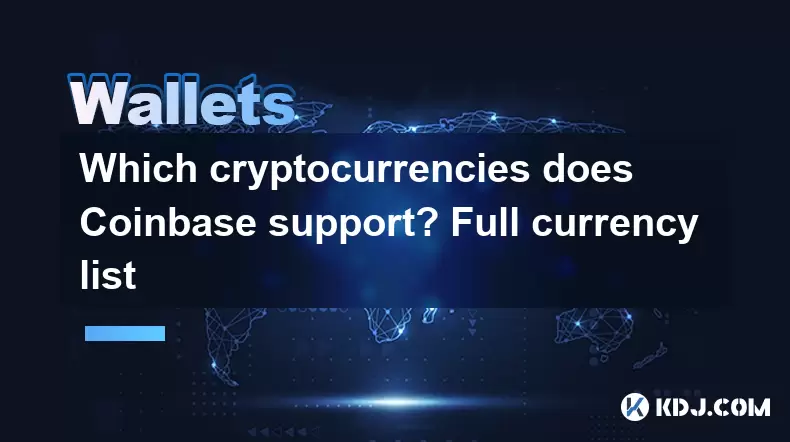
Which cryptocurrencies does Coinbase support? Full currency list
Jun 28,2025 at 08:36am
Overview of Cryptocurrencies Supported by CoinbaseCoinbase is one of the most popular and trusted cryptocurrency exchanges globally. It provides users with a platform to buy, sell, trade, and store various digital assets. As of the latest updates, Coinbase supports over 200 cryptocurrencies, including major ones like Bitcoin (BTC), Ethereum (ETH), and L...
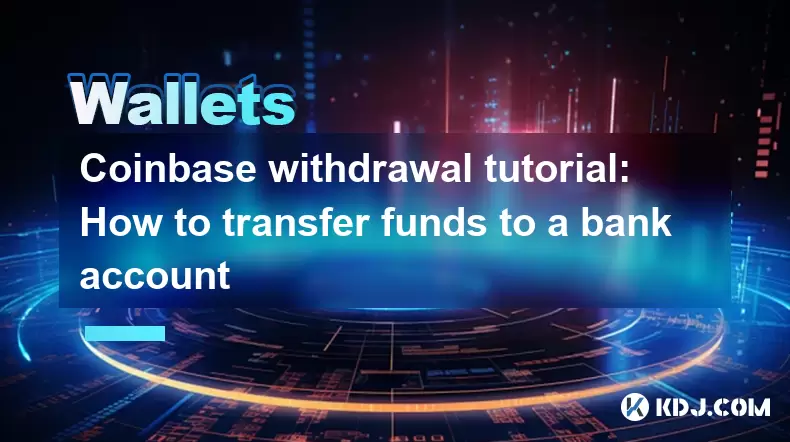
Coinbase withdrawal tutorial: How to transfer funds to a bank account
Jun 28,2025 at 02:35am
Understanding Coinbase WithdrawalsCoinbase is one of the most widely used cryptocurrency platforms, allowing users to buy, sell, and store digital assets. Once you've successfully traded or held your crypto on Coinbase, the next logical step may be to withdraw funds to a bank account. This process involves converting your cryptocurrency into fiat curren...
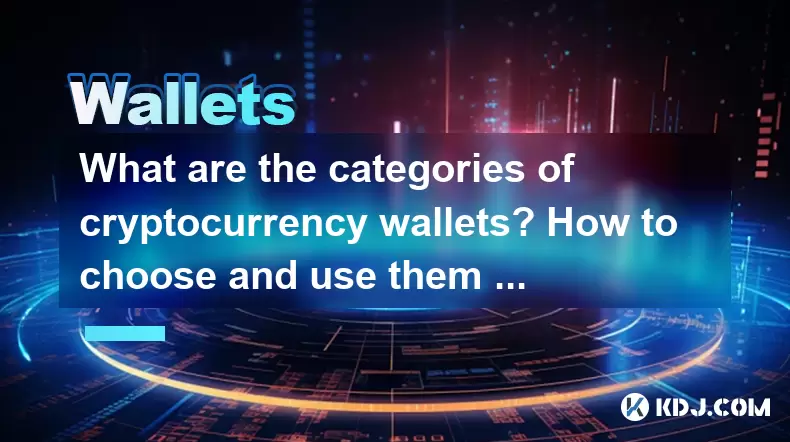
What are the categories of cryptocurrency wallets? How to choose and use them safely?
Jun 21,2025 at 10:42pm
Understanding Cryptocurrency WalletsCryptocurrency wallets are essential tools for anyone involved in the digital asset ecosystem. They allow users to store, send, and receive cryptocurrencies securely. Unlike traditional wallets that hold physical money, crypto wallets manage cryptographic keys—private and public—which interact with blockchain networks...
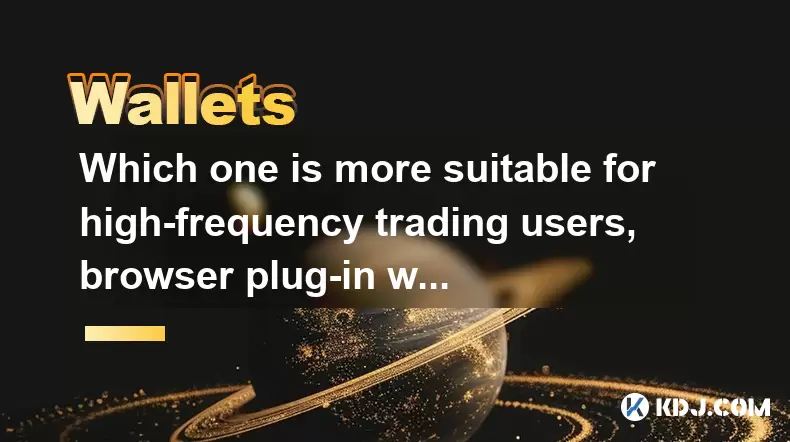
Which one is more suitable for high-frequency trading users, browser plug-in wallets or independent application wallets?
Jun 23,2025 at 08:22am
Understanding the Role of Wallets in High-Frequency TradingFor high-frequency trading (HFT) users in the cryptocurrency market, wallet selection is critical due to the need for speed, security, and seamless integration with trading platforms. HFT involves executing a large number of trades within seconds or even milliseconds, which demands a wallet that...

What are the differences between the operating mechanisms of on-chain wallets and off-chain wallets? Is there a big difference in transaction fees?
Jun 25,2025 at 08:49am
Understanding On-Chain WalletsOn-chain wallets are digital wallets that directly interact with the blockchain network. These wallets store users' private keys, which are essential for signing and authorizing transactions on the blockchain. When using an on-chain wallet, every transaction must be recorded and verified by the decentralized nodes in the ne...

How to stake cryptocurrencies on Coinbase? Benefits and risks
Jun 27,2025 at 06:36pm
Understanding Cryptocurrency Staking on CoinbaseStaking cryptocurrencies involves locking up digital assets to support the operations of a blockchain network, typically in return for rewards. Coinbase, one of the most popular cryptocurrency exchanges globally, offers staking services for several proof-of-stake (PoS) coins. Users can stake their holdings...

Which cryptocurrencies does Coinbase support? Full currency list
Jun 28,2025 at 08:36am
Overview of Cryptocurrencies Supported by CoinbaseCoinbase is one of the most popular and trusted cryptocurrency exchanges globally. It provides users with a platform to buy, sell, trade, and store various digital assets. As of the latest updates, Coinbase supports over 200 cryptocurrencies, including major ones like Bitcoin (BTC), Ethereum (ETH), and L...

Coinbase withdrawal tutorial: How to transfer funds to a bank account
Jun 28,2025 at 02:35am
Understanding Coinbase WithdrawalsCoinbase is one of the most widely used cryptocurrency platforms, allowing users to buy, sell, and store digital assets. Once you've successfully traded or held your crypto on Coinbase, the next logical step may be to withdraw funds to a bank account. This process involves converting your cryptocurrency into fiat curren...

What are the categories of cryptocurrency wallets? How to choose and use them safely?
Jun 21,2025 at 10:42pm
Understanding Cryptocurrency WalletsCryptocurrency wallets are essential tools for anyone involved in the digital asset ecosystem. They allow users to store, send, and receive cryptocurrencies securely. Unlike traditional wallets that hold physical money, crypto wallets manage cryptographic keys—private and public—which interact with blockchain networks...

Which one is more suitable for high-frequency trading users, browser plug-in wallets or independent application wallets?
Jun 23,2025 at 08:22am
Understanding the Role of Wallets in High-Frequency TradingFor high-frequency trading (HFT) users in the cryptocurrency market, wallet selection is critical due to the need for speed, security, and seamless integration with trading platforms. HFT involves executing a large number of trades within seconds or even milliseconds, which demands a wallet that...

What are the differences between the operating mechanisms of on-chain wallets and off-chain wallets? Is there a big difference in transaction fees?
Jun 25,2025 at 08:49am
Understanding On-Chain WalletsOn-chain wallets are digital wallets that directly interact with the blockchain network. These wallets store users' private keys, which are essential for signing and authorizing transactions on the blockchain. When using an on-chain wallet, every transaction must be recorded and verified by the decentralized nodes in the ne...
See all articles























































































